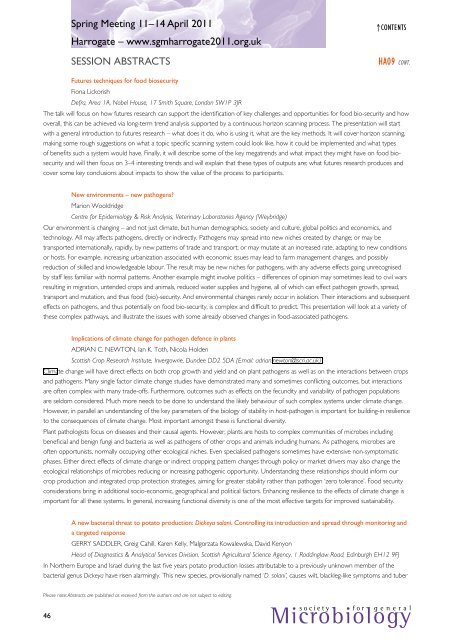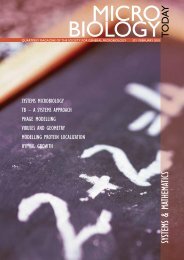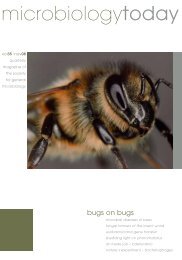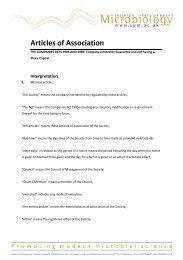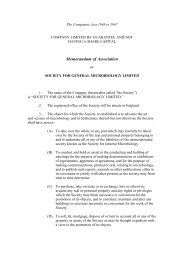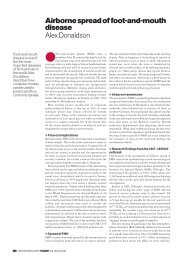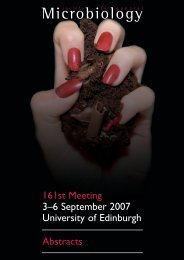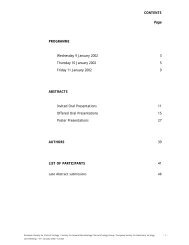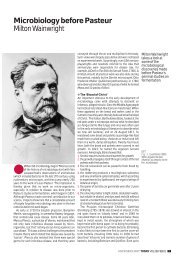Spring Conference 2011 - Society for General Microbiology
Spring Conference 2011 - Society for General Microbiology
Spring Conference 2011 - Society for General Microbiology
You also want an ePaper? Increase the reach of your titles
YUMPU automatically turns print PDFs into web optimized ePapers that Google loves.
Please note: Abstracts are published as received from the authors and are not subject to editing.<br />
46<br />
<strong>Spring</strong> Meeting 11–14 April <strong>2011</strong><br />
Harrogate – www.sgmharrogate<strong>2011</strong>.org.uk<br />
SESSION AbSTrACTS<br />
↑Contents<br />
HA09 Cont.<br />
Futures techniques <strong>for</strong> food biosecurity<br />
Fiona lickorish<br />
Defra, Area 1A, Nobel House, 17 Smith Square, London SW1P 3JR<br />
The talk will focus on how futures research can support the identification of key challenges and opportunities <strong>for</strong> food bio-security and how<br />
overall, this can be achieved via long-term trend analysis supported by a continuous horizon scanning process. The presentation will start<br />
with a general introduction to futures research – what does it do, who is using it, what are the key methods. it will cover horizon scanning,<br />
making some rough suggestions on what a topic specific scanning system could look like, how it could be implemented and what types<br />
of benefits such a system would have. Finally, it will describe some of the key megatrends and what impact they might have on food biosecurity<br />
and will then focus on 3–4 interesting trends and will explain that these types of outputs are; what futures research produces and<br />
cover some key conclusions about impacts to show the value of the process to participants.<br />
New environments – new pathogens?<br />
Marion Wooldridge<br />
Centre <strong>for</strong> Epidemiology & Risk Analysis, Veterinary Laboratories Agency (Weybridge)<br />
Our environment is changing – and not just climate, but human demographics, society and culture, global politics and economics, and<br />
technology. All may affects pathogens, directly or indirectly. Pathogens may spread into new niches created by change; or may be<br />
transported internationally, rapidly, by new patterns of trade and transport; or may mutate at an increased rate, adapting to new conditions<br />
or hosts. For example, increasing urbanization associated with economic issues may lead to farm management changes, and possibly<br />
reduction of skilled and knowledgeable labour. The result may be new niches <strong>for</strong> pathogens, with any adverse effects going unrecognised<br />
by staff less familiar with normal patterns. Another example might involve politics – differences of opinion may sometimes lead to civil wars<br />
resulting in migration, untended crops and animals, reduced water supplies and hygiene, all of which can effect pathogen growth, spread,<br />
transport and mutation, and thus food (bio)-security. And environmental changes rarely occur in isolation. Their interactions and subsequent<br />
effects on pathogens, and thus potentially on food bio-security, is complex and difficult to predict. This presentation will look at a variety of<br />
these complex pathways, and illustrate the issues with some already observed changes in food-associated pathogens.<br />
Implications of climate change <strong>for</strong> pathogen defence in plants<br />
ADriAN C. NEWTON, ian K. Toth, Nicola Holden<br />
Scottish Crop Research Institute, Invergowrie, Dundee DD2 5DA (Email: adrian.newton@scri.ac.uk)<br />
Climate change will have direct effects on both crop growth and yield and on plant pathogens as well as on the interactions between crops<br />
and pathogens. Many single factor climate change studies have demonstrated many and sometimes conflicting outcomes, but interactions<br />
are often complex with many trade-offs. Furthermore, outcomes such as effects on the fecundity and variability of pathogen populations<br />
are seldom considered. Much more needs to be done to understand the likely behaviour of such complex systems under climate change.<br />
However, in parallel an understanding of the key parameters of the biology of stability in host-pathogen is important <strong>for</strong> building-in resilience<br />
to the consequences of climate change. Most important amongst these is functional diversity.<br />
Plant pathologists focus on diseases and their causal agents. However, plants are hosts to complex communities of microbes including<br />
beneficial and benign fungi and bacteria as well as pathogens of other crops and animals including humans. As pathogens, microbes are<br />
often opportunists, normally occupying other ecological niches. Even specialised pathogens sometimes have extensive non-symptomatic<br />
phases. Either direct effects of climate change or indirect cropping pattern changes through policy or market drivers may also change the<br />
ecological relationships of microbes reducing or increasing pathogenic opportunity. understanding these relationships should in<strong>for</strong>m our<br />
crop production and integrated crop protection strategies, aiming <strong>for</strong> greater stability rather than pathogen ‘zero tolerance’. Food security<br />
considerations bring in additional socio-economic, geographical and political factors. Enhancing resilience to the effects of climate change is<br />
important <strong>for</strong> all these systems. in general, increasing functional diversity is one of the most effective targets <strong>for</strong> improved sustainability.<br />
A new bacterial threat to potato production: Dickeya solani. Controlling its introduction and spread through monitoring and<br />
a targeted response<br />
GErrY SADDlEr, Greig Cahill, Karen Kelly, Malgorzata Kowalewska, David Kenyon<br />
Head of Diagnostics & Analytical Services Division, Scottish Agricultural Science Agency, 1 Roddinglaw Road, Edinburgh EH12 9FJ<br />
in Northern Europe and israel during the last five years potato production losses attributable to a previously unknown member of the<br />
bacterial genus Dickeya have risen alarmingly. This new species, provisionally named ‘D. solani’, causes wilt, blackleg-like symptoms and tuber<br />
s o c i e t y f o r g e n e r a l<br />
<strong>Microbiology</strong>


